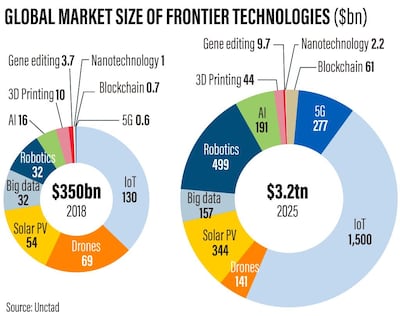A few developing nations have strong capabilities to adopt and adapt frontier technologies that can help them recover from the Covid-19 pandemic, but most lag behind, a new United Nations report shows.
Frontier technologies that take advantage of digitalisation and connectivity represented a $350 billion market in 2018. That will surge to more than $3.2 trillion in the next five years, according to a report from the United Nations Conference on Trade and Development. The survey ranks 158 countries in terms of their readiness to adopt these technologies.
The US and European countries dominate the top 10 places, but developing nations such as India, the Philippines, Ukraine and Vietnam are credited as outperformers in terms of technological adoption, relative to the size of the economies.
“Technological progress is essential for sustainable development but can also perpetuate inequalities or create new ones. The task for governments is thus to maximise the potential benefits, while mitigating harmful outcomes,” the report said.
Frontier technologies include artificial intelligence, the Internet of Things, big data, blockchain, 5G, 3D printing, robotics, drones, gene editing, nanotechnology and solar photovoltaic panels, among others.
The top performers in the index are typically associated with world-class innovation and high gross domestic product. The top five countries in the overall index were the US, Switzerland, the UK, Sweden and Singapore.
And although some emerging nations have shown prowess in adopting cutting-edge technology, Unctad warned of serious implications for developing countries if they are either "overwhelmed" or "simply left behind".
“It is key that developing countries do not miss the wave of frontier technologies, otherwise it will further deepen inequalities,” Unctad’s acting secretary-general Isabelle Durant said.
Societies and productive sectors need to be well prepared and build the required skills, Ms Durant said. “Frontier technologies have already brought enormous benefits, but rapid advances can have serious downsides if they outpace the ability of societies to adapt,” she added.
Countries best prepared to equitably use, adopt and adapt these technologies are mainly in Northern America and Europe. Those least prepared are in sub-Saharan Africa and other developing regions, according to Unctad.
“Technologies are not deterministic … we can shape their pathways for good … and we have an obligation to do it,” Shamika Sirimanne, Unctad’s director of technology and logistics, said.
“Governments and other development actors will need to prepare fast. Developing countries, particularly the least developed ones, can’t afford to miss this new wave of rapid technological change,” she added.
The UN body also said developing countries need to work towards achieving universal internet access and ensure all of their citizens have opportunities to learn the skills required for frontier technologies.
“A whole-of-government approach is needed to absorb these technologies, as opposed to working in silos,” Ms Sirimanne said. Developing countries should also align science, technology and innovation policies with industrial policies, she added.
“New technologies can re-invigorate traditional production sectors and speed up industrialisation and economic structural transformation.”
Each wave of technological change has brought inequality in a new shape in the past, the report said.
“The outcomes for one generation have affected the opportunities for the next, resulting in inter-generational transmission of inequalities. Between 1820 and 2002, the contribution of between-country inequality to global inequality rose from 28 per cent to 85 per cent,” it added.
Currently, the major concerns are related to the risk of automation taking jobs, declining labour rights, inequalities created by market and profit concentration and the increase of disparity driven by AI and widening technological gaps.
The effect that inequalities will have within and between countries will largely be shaped by national policies, Unctad said.
Killing of Qassem Suleimani
Tightening the screw on rogue recruiters
The UAE overhauled the procedure to recruit housemaids and domestic workers with a law in 2017 to protect low-income labour from being exploited.
Only recruitment companies authorised by the government are permitted as part of Tadbeer, a network of labour ministry-regulated centres.
A contract must be drawn up for domestic workers, the wages and job offer clearly stating the nature of work.
The contract stating the wages, work entailed and accommodation must be sent to the employee in their home country before they depart for the UAE.
The contract will be signed by the employer and employee when the domestic worker arrives in the UAE.
Only recruitment agencies registered with the ministry can undertake recruitment and employment applications for domestic workers.
Penalties for illegal recruitment in the UAE include fines of up to Dh100,000 and imprisonment
But agents not authorised by the government sidestep the law by illegally getting women into the country on visit visas.
Subscribe to Beyond the Headlines
Five%20calorie-packed%20Ramadan%20drinks
%3Cp%3E%3Cstrong%3ERooh%20Afza%3C%2Fstrong%3E%0D%3Cbr%3E100ml%20contains%20414%20calories%0D%3Cbr%3E%3Cstrong%3ETang%20orange%20drink%3C%2Fstrong%3E%0D%3Cbr%3E100ml%20serving%20contains%20300%20calories%0D%3Cbr%3E%3Cstrong%3ECarob%20beverage%20mix%3C%2Fstrong%3E%0D%3Cbr%3E100ml%20serving%20contains%20about%20300%20calories%0D%3Cbr%3E%3Cstrong%3EQamar%20Al%20Din%20apricot%20drink%3C%2Fstrong%3E%0D%3Cbr%3E100ml%20saving%20contains%2061%20calories%0D%3Cbr%3E%3Cstrong%3EVimto%20fruit%20squash%3C%2Fstrong%3E%0D%3Cbr%3E100ml%20serving%20contains%2030%20calories%3C%2Fp%3E%0A
WE%20NO%20LONGER%20PREFER%20MOUNTAINS
%3Cp%3E%3Cstrong%3EDirector%3A%3C%2Fstrong%3E%20Inas%20Halabi%3C%2Fp%3E%0A%3Cp%3E%3Cstrong%3EStarring%3A%20%3C%2Fstrong%3ENijmeh%20Hamdan%2C%20Kamal%20Kayouf%2C%20Sheikh%20Najib%20Alou%3C%2Fp%3E%0A%3Cp%3E%3Cstrong%3ERating%3A%3C%2Fstrong%3E%204%2F5%3C%2Fp%3E%0A
SPECS
%3Cp%3E%3Cstrong%3EEngine%3C%2Fstrong%3E%3A%202-litre%20direct%20injection%20turbo%20%0D%3Cbr%3E%3Cstrong%3ETransmission%3C%2Fstrong%3E%3A%207-speed%20automatic%20%0D%3Cbr%3E%3Cstrong%3EPower%3C%2Fstrong%3E%3A%20261hp%20%0D%3Cbr%3E%3Cstrong%3ETorque%3C%2Fstrong%3E%3A%20400Nm%20%0D%3Cbr%3E%3Cstrong%3EPrice%3C%2Fstrong%3E%3A%20From%20Dh134%2C999%26nbsp%3B%3C%2Fp%3E%0A
Red flags
- Promises of high, fixed or 'guaranteed' returns.
- Unregulated structured products or complex investments often used to bypass traditional safeguards.
- Lack of clear information, vague language, no access to audited financials.
- Overseas companies targeting investors in other jurisdictions - this can make legal recovery difficult.
- Hard-selling tactics - creating urgency, offering 'exclusive' deals.
Courtesy: Carol Glynn, founder of Conscious Finance Coaching
The specs
Engine: 3.0-litre six-cylinder turbo
Power: 398hp from 5,250rpm
Torque: 580Nm at 1,900-4,800rpm
Transmission: Eight-speed auto
Fuel economy, combined: 6.5L/100km
On sale: December
Price: From Dh330,000 (estimate)
Killing of Qassem Suleimani
SHAITTAN
%3Cp%3E%3Cstrong%3EDirector%3A%20%3C%2Fstrong%3EVikas%20Bahl%3Cbr%3E%3Cstrong%3EStarring%3A%20%3C%2Fstrong%3EAjay%20Devgn%2C%20R.%20Madhavan%2C%20Jyothika%2C%20Janaki%20Bodiwala%3Cbr%3E%3Cstrong%3ERating%3A%20%3C%2Fstrong%3E3%2F5%3C%2Fp%3E%0A
The specs
AT4 Ultimate, as tested
Engine: 6.2-litre V8
Power: 420hp
Torque: 623Nm
Transmission: 10-speed automatic
Price: From Dh330,800 (Elevation: Dh236,400; AT4: Dh286,800; Denali: Dh345,800)
On sale: Now
Pieces of Her
Stars: Toni Collette, Bella Heathcote, David Wenham, Omari Hardwick
Director: Minkie Spiro
Rating:2/5
UAE v Zimbabwe A, 50 over series
Fixtures
Thursday, Nov 9 - 9.30am, ICC Academy, Dubai
Saturday, Nov 11 – 9.30am, ICC Academy, Dubai
Monday, Nov 13 – 2pm, Dubai International Stadium
Thursday, Nov 16 – 2pm, ICC Academy, Dubai
Saturday, Nov 18 – 9.30am, ICC Academy, Dubai
ONCE UPON A TIME IN GAZA
Starring: Nader Abd Alhay, Majd Eid, Ramzi Maqdisi
Directors: Tarzan and Arab Nasser
Rating: 4.5/5
More from Rashmee Roshan Lall
UPI facts
More than 2.2 million Indian tourists arrived in UAE in 2023
More than 3.5 million Indians reside in UAE
Indian tourists can make purchases in UAE using rupee accounts in India through QR-code-based UPI real-time payment systems
Indian residents in UAE can use their non-resident NRO and NRE accounts held in Indian banks linked to a UAE mobile number for UPI transactions



